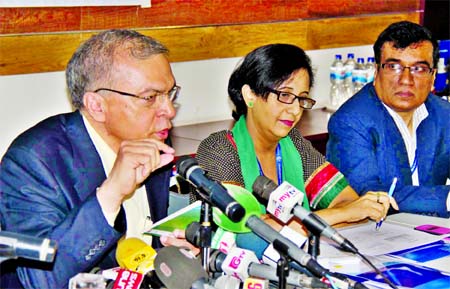
Staff Reporter :
Terming the last parliamentary election as controversial, the Transparency International Bangladesh (TIB) has laid emphasis on holding an inclusive and credible election to make the parliament more effective.
“The present parliament has become a safe haven of ruling party for expanding their singular supremacy. Only 6 per cent of the total time has been spent for constituting laws in the present parliament where only 28 lawmakers took part in the discussion. In fact, the present parliament has become an institutional forum to repress leaders of opponent political parties,” Executive Director of TIB Dr Iftekharuzzaman said on Sunday.
He was addressing a press conference at his office in the city’s Dhanmondi to unveil Parliament Watch report on 10th national parliament (2nd session to sixth session). The TIB also placed 12-point proposal to make the parliament more effective.
Dr Iftekharuzzaman said: “The culture of ‘oiling’ of so-called opposition party in parliament has become very open. Definitely, the January-5 election was a controversial one. When a fresh election will be held without controversy, then no one will say the election is controversial.”
The TIB collected information of 10th parliament from second to sixth sessions to prepare the research paper. As the source of information, the TIB members followed parliament session directly and used news aired by Sangsad Television. Besides, it used bulletins, reports of parliamentary standing committees, government gazette, books, features and newspaper articles.
The TIB executive director said: “We still expect that an inclusive election involving major political parties will be held soon. But it depends on the responsible people of political field. In a democratic system, an election is held with the participation of all political parties. I think without holding an inclusive election, it’s not possible to have an effective parliament.”
According to the TIB research report, out of total working days, the presence of Leader of the House in the parliament was 83 per cent while the presence of Leader of the Opposition was 57 per cent.
Although the 10th parliament witnessed comparatively more presence of lawmakers and faced less quorum crisis, the activities of parliament in overall raised huge questions in the concerned circles. At the same time, the ruling and opposition parties jointly conducted oral attack on rival political parties outside the parliament, the TIB report said.
About 50 parliamentary standing committees were formed in the 10th parliament, but strangely only one opposition lawmaker was nominated as the president of one committee. Although the members’ presence in the committee meeting was 56 per cent, the parliamentary committees faced severe criticism for influencing some major decisions by a section of committee members.
There are also allegations of business interests of some committee members. The present and former ministers, who are members of parliament standing committees, created an unholy nexus to exercise their power for influencing decisions.
According to TIB report analyzing data of eighth, ninth and tenth parliaments, the number of appreciations of ruling party and government was 7500 times while the opponent political alliance was criticized by the ruling party for about 7268 times.
Meanwhile, criticising the opposition party without naming Jatiya Party, Iftekharuzzaman said: “It is playing a dual role — the opposition on one hand and the ruling party on the other. So, they are so-called opposition party. If they want to play the role of the real opposition in parliament, they must change their stance to become an opposition party in real sense.”

